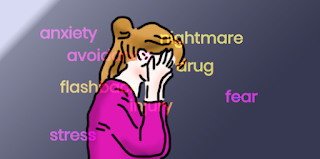Dealing with a Trauma
A trauma is a deep emotional wound and injury caused by an event that is accompanied by loss of control or threat to life.
Potential causes include accidents, mental, physical or sexual abuse, bereavement, or severe illness.
Almost every person will face such traumatic experiences within their life.
Potential causes include accidents, mental, physical or sexual abuse, bereavement, or severe illness.
Almost every person will face such traumatic experiences within their life.
Laurell Kaye Hamilton, an American fantasy and romance writer once said: "There are wounds that never show on the body that are deeper and more hurtful than anything that bleeds."
Trauma does not necessarily lead to psychological damage or consequences. Often, traumatized individuals can overcome their experiences. But depending on the personality, the individual's ability to cope with problems, and the stress limit, trauma can also provoke serious mental disorders like persistent fears, depression, or post-traumatic stress disorder (PTSD).
In a threatening situation, our body reacts with the emergency plan "fight, flight, or freeze". Along with the usual stress reactions, a kind of immobility could occur. This can affect one's perception psychologically. The so-called "dissociation" is a mental protection mechanism that leads to affected individuals feeling separated in a way. This can make it harder to process the trauma and accept it as part of one's own life.
(dissociation: separation of some aspects of mental functioning from conscious awareness, leading to a degree of mental dysfunction or to mental conditions including dissociative identity disorder.)
Signs of Post-Traumatic Stress Disorder (PTSD)
Dissociation can increase the risk for PTSD, which occurs when the normal processing system is over strained. Among the symptoms of PTSD are:
- Problems with concentration, easily startled
- Irritability, sleep issues, sleep disturbances
- Nightmares, frequent repetition of traumatic images
- Loss of interest, emotional numbness
If symptoms occur shortly after the traumatic event, they are usually classified as an acute stress reaction. If complaints persist longer than four weeks it is considered post-traumatic stress disorder.
Approaches to dealing with and overcoming trauma
Here are some recommendations for those affected and their families:
- It is highly recommended for affected people to talk about their traumatic experiences. Suppressing related feelings and memories can worsen the symptoms.
- Don't pressure the affected people, your partner, your friend, your colleague into talking. And don't pressure yourself into talking. Silence can be helpful and is often more 'meaningful, expressive, convincing, significant' than throwing words into the air.
- Be patient with yourself or the affected individual.
- Accept what has occurred, accept that it has touched you, and accept the trauma.
- Become active: Activities like sports, music or social interactions can be helpful.
- Avoid numbing: Alcohol or drugs should not be used to suppress the trauma.
- If the symptoms persist: Seek professional help.






Comments
Post a Comment